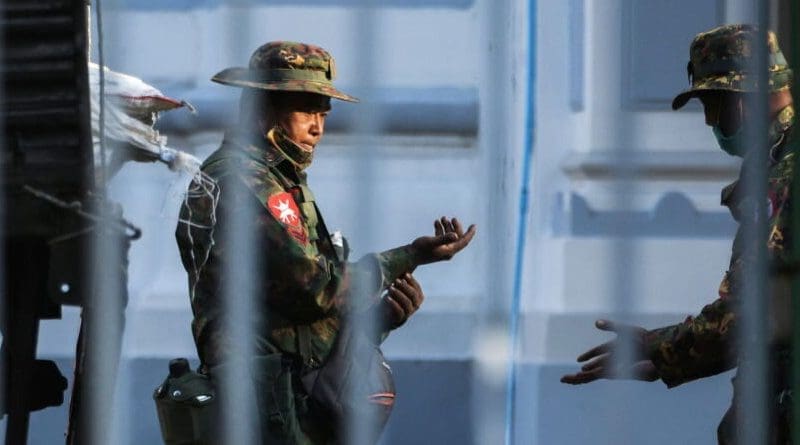Myanmar Regime’s Brutality Began Long Before The Coup – Analysis
By Arab News
By Dr. Azeem Ibrahim*
For over a year, members of the Tatmadaw, the Myanmar military, have been fighting a civil war against the country’s people. After the overthrow in 2021 of the civilian government led by Aung San Suu Kyi, remnants of her party, the National League for Democracy, and armed groups it is linked to under the umbrella People’s Defense Force, have been leading a tenacious resistance against the junta.
Out of the view of much of the world, the military has razed villages, murdered protesters, disappeared dissidents, and conducted a campaign of brutality and savagery in its bid to take total control of the country.
For months, evidence of military crimes has trickled from Myanmar. These include claims that when opponents of the coup took to the streets, soldiers were instructed to treat those holding phones and cameras as combatants, and to shoot photographers the moment they attempted to take a picture.
A BBC investigation, published this week, involved the confessions of members of the armed forces. They attest to a military culture steeped in viciousness.
One defecting soldier, Maung Oo, described attacks on villages and monasteries in May this year, saying: “We were ordered to round up all the men and shoot them dead. The saddest thing was we had to kill elderly people and a woman.”
A corporal, Aung, told the BBC that in one attack on a village, “we also had an order to set fire to every large and decent house.”
Descriptions of a “scorched earth” approach and retaliatory violence are shocking, but should come as no surprise. This is the same policy pursued and pioneered by the Tatmadaw in other conflicts, most notably against the Rohingya minority.
Since 2017, when the army began its most recent attempts to drive the Rohingya, a Muslim minority and long-time second-class citizens of Myanmar, out of the country, its tactics have not changed.
Then and since, the military entered Rohingya villages in Rakhine state, razing buildings, killing indiscriminately, committing sexual violence and looting. These attacks were intended to force as many Rohingya out of the country as possible, precipitating a major refugee crisis — the consequences of which are still evident.
Ironically, the military’s 2017 campaign against the Rohingya was carried out while Suu Kyi and the NLD were in government, and was either minimized or justified by her and by many NLD politicians. Suu Kyi’s Facebook page even declared sexual violence against the Rohingya, a known tactic of the military, an epidemic of “fake rape.”
In the war since 2021, as the BBC investigation reveals, the military has also carried out a campaign of sexual violence. Defecting soldiers deny that they were involved, but claim that it was pursued by the military as vengeance for villages’ apparent support for the PDF. The BBC spoke to some of the women who were attacked, and they attest to the violence they suffered.
The military’s seizure of power has forged new alliances. Members of minority ethnic groups, including in Shan and Rakhine states, who had been violently attacked while the NLD was in government, now ally with and train the PDF in its battle with the Tatmadaw.
Rohingya and other ethnic groups were classed as “terrorists” by the military after 2017, with the label used to justify violence against them, even as the international community, and international courts, began to investigate and indict the regime for commission and complicity with acts of genocide.
Now the military, in denying the BBC report, once again declares that, contrary to evidence, it has never attacked civilian populations. Instead, a spokesman said that all it has done is fight “terrorists” — the same terrorists who until recently were in the military’s approved government.
The violence perpetrated by the Tatmadaw has deep roots. The same tactics have been part of its genocidal campaign against Rohingya and other ethnic minority groups for years. Now that they are employed against most of the country, old enemies and former allies are uniting to oppose the brutality of the military, as it attempts once again to consolidate power on the back of instrumentalized violence.
- Dr. Azeem Ibrahim is the director of special initiatives at the Newlines Institute for Strategy and Policy in Washington and author of “The Rohingyas: Inside Myanmar’s Genocide” (Hurst, 2017). Twitter: @AzeemIbrahim


Having been involved with Burma/Myanmar for nearly 30 years, I found this a great read…very thoughtful.